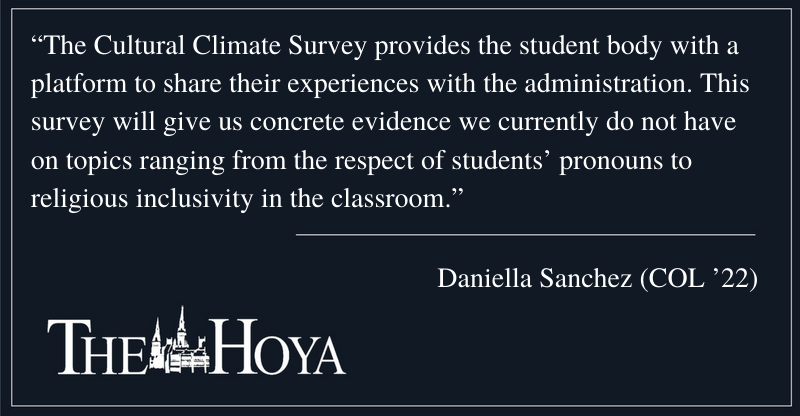“We need concrete evidence.” “Where are the numbers on that?” “How do you know this is an issue?”
Anyone advocating an issue at Georgetown University who has engaged with the administration has probably encountered these questions. As students, we can speak to our individual experiences, but providing the statistical evidence the administration demands to validate our perspectives is challenging.
We know what the issues are. Every day, students experience bias with an ineffective bias reporting system, limited support for certain marginalized communities and a lack of cultural understanding among the student body and university employees — we just do not have the numbers to accurately capture the frequency. Many of these issues the Black Survivors Coalition exposed, yet it took too long for the administration to reluctantly respond. So, take the survey. The more students who participate, the more substantive the results will be.
For months, the Cultural Climate Survey Student Advisory Committee, created by the Georgetown University Student Association, has met with a team of staff and administration to prepare the survey to accurately represent Georgetown and reflect student life. The Cultural Climate Survey provides the student body with a platform to share their experiences with the administration. This survey will give us concrete evidence we currently do not have on topics ranging from the respect of students’ pronouns to religious inclusivity in the classroom. Not to mention, this survey could help us to uncover new unrecognized or unaddressed narratives.
Every voice matters. Even students who do not feel they fit into a “culture” are still represented in this survey. The survey does not exclusively focus on ethnic and racial identities but also on the narratives of a student’s ability, socioeconomic status, religion, sexuality and gender, among other identities. There are questions about socioeconomic status, a student’s experience in the classroom and experience with support from staff and faculty.
Each person’s experience at Georgetown, regardless of whether they belong to an explicit cultural community, is valid and critical to the results of this survey. Many diverse responses will enable the university to analyze student experiences across the board, not just those of certain communities. Students and administration will assess the different levels of support among specific religions, the level of comfort at Georgetown across socioeconomic levels or the amount of support provided by each campus office. The university could also identify overlapping concerns and common issues across different communities, which would reveal broader institutional issues while still uncovering community-specific issues. For student activists, this survey alleviates the pressure to find support, as they will discover all of the communities that share their experience and can combine forces. Plus, the survey’s results will provide indisputable, concrete evidence for student activists to present to administration when pushing for action.
While students may have preconceptions about what the data will expose in regard to certain issues because we know about the issues within our communities, the questions are not intentionally targeted to corroborate these preconceptions. The Office of Assessment and Decision Support has diligently worked with the Cultural Climate Survey Student Advisory Committee to ensure each question is worded correctly and does not aim for a particular answer. Therefore, the results of the survey will not be biased and the administration cannot dispute the evidence displayed.
We want students and the administration to obtain the most unbiased results. For problems that students already know exist, it is essential to have a basis to locate the root of the issue. We need to have data proving that this problem is occurring to a specific community or within a particular aspect of Georgetown’s institutions. The survey has many broad questions about support and resources that do not have an anticipated result. On some subjects, students and the administration may never have considered there was an issue. The survey will provide us with information to take action to make the Georgetown community more intersectional, transparent and accountable.
The university has responded to climate surveys in the past with tangible actions. Starting in 2016, the administration has attempted to engage with the student body regarding the results of the Sexual Assault and Misconduct Climate Survey. The university established a sense of transparency by sending emails with the results and subsequently holding listening sessions and presentations. The administration, with a push from student activists, has made bystander training mandatory for first-year students, which demonstrates some progress on sexual assault prevention efforts. However, the administration has not acted on the issues affecting every community, as the Black Survivors Coalition pointed out. It is evident that the approach of administration did not accurately incorporate the intersectional experiences of students, and the Cultural Climate Survey will provide the missing piece through its identity-based approach.
With the same effort the Cultural Climate Survey Student Advisory Committee put into ensuring student voices were heard throughout the development and launch of the Cultural Climate Survey, we will continue to pressure the administration to take action on the results of the data, maintain transparency in their plans and consider student input after results are released.
Recently, the Black Survivors Coalition has pushed for largely ignored issues to be addressed because Georgetown has acted with a one-dimensional perspective when addressing concerns that arose from the Sexual Assault and Misconduct Climate Survey. Through the new Cultural Climate Survey, GUSA and student advocates will compel the administration to consider the intersectional aspect of every issue. With this new data, we can push Georgetown to never exclude the voice of any community from critical issues on campus.
Daniella Sanchez is a sophomore in the College.














